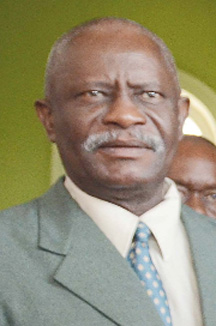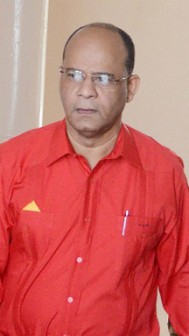Former Commissioner of Police and now APNU MP Winston Felix yesterday accused the PPP/C government of hiring drug lord Roger Khan to help it fight crime and he fingered Home Affairs Minister Clement Rohee in interference in police matters, including attempting to prevent an arrest.
While the government has been widely and frequently accused of enlisting the services of Khan, yesterday’s charge was even more stunning as Felix was the Police Commissioner at the time and had himself been criticised over his association with Khan through a mutual contact.
Amid a plethora of accusations against the government on day four of the budget debate yesterday, Felix also saddled it with blame for the 2002 jail-break, which sparked several years of bloody crime and saw Khan’s involvement replete with a phone-bugging scandal that also ensnared him
In giving instances of Rohee’s interference, Felix said that the Minister has been directing the transfers of certain senior police officers, whom it suspected had written an anonymous letter detailing certain irregular behaviour during the questioning of suspects.

Felix further recalled that on election day last year, he was in Sophia when a police vehicle drove up and he heard a transmission from the police communications network, where a policeman was reporting the arrest of an Office of the President official. Felix said he heard a call sign with which he was familiar calling senior members of the force and admonishing the police not to arrest the official.
Felix also made reference to a widely-publicised recent incident, where Rohee requested the disciplining of police commander David Ramnarine over statements he had made about $90M which had supposedly been set aside for the upkeep of the police during last year’s elections. “There is another matter currently in the public domain which the Honourable Minister [of Home Affairs] has made pronouncements [on] and ordering that the acting Commissioner discipline a certain senior police officer. Then he proceeded to instruct that the officer must explain why he should not be charged. This is utterly incorrect. Firstly the Police Discipline Act Chapter 17:01 has set out the procedure to discipline any member of the force below the rank of Commissioner. The Honourable Minister has no part in that procedure. He may discuss matters of that nature with the Commissioner but he cannot direct him. I know of certain retired Commissioners who would have told the Minister where his role ends and where Commissioner’s commences,” said Felix.
“I hope the acting Commissioner would put on some muscle and prevent intrusion into his space,” he added, noting that when a breach of discipline is discovered, the rank who has defaulted must be served with a notice in which he is told that he is under investigation of the alleged breach and of his or her right to refuse or to make a written or oral statement if they so desire.
“There is another procedure to be followed when the investigation is completed and charge is proffered. These steps must be followed where any ranks below the rank of Commissioner is to be charged,” he said.
Felix stated that in the case under review the acting Commissioner of Police has to determine whether he would write the Assistant Commissioner a letter with a view to censuring him or whether he would proffer charges. “The Minister’s voice should not have been heard. By instructing the acting Commissioner to write the Assistant Commissioner to explain why he should not be charged, he misled him because such an action is not known to the Police Discipline Act Chapter 17:01,” he said.
Statistically insignificant

Going back to history, APNU MP said that in 1992 after there was a change in the government, there was an escalation of crime and this led to an undermining of some members of the Guyana Police Force. “When the government changed in 1992, marijuana was known to be trafficked in and out of Guyana. Cocaine trafficking was statistically insignificant. The new government began dismantling structures set up by the previous government to coordinate activities of all agencies having a role to play in the new drug strategy… “What is certain Mr. Speaker is that the incidences of crime are not reducing. This means that persons must live in fear for want of protection against criminal acts,” he said. “Mr. Speaker it is pointless glorifying ourselves in figures and the millions and millions of dollars allocated to the Guyana Police Force. That means nothing to the suffering public who want to feel secure while at home, at work or on the street,” he argued.
He said the authorities impaired the Georgetown Prisons in February 2002 by allowing officers and prisoners to join the Mash band on the street, leading to the infamous Mash Day jailbreak. “Five notorious criminals escaped and mayhem resulted. The government managed the situation by committing crime to solve crime. They enlisted the assistance of a fugitive from North American justice, well known as Shaheed ‘Roger’ Khan. Police and GDF personnel twice arrested him with a cache of firearm, ammunition, silencers and grenades. But his charges for various reasons were dismissed [in] court. He is now a guest of the American government, having been convicted of drug trafficking, money laundering and gun-running to the US,” said Felix.
He spoke of the drive-by and walk-by shootings, which he described as being the order of the day. “Illegal firearms were regularly in use, kidnapping arrived on the scene in Guyana and the village of Buxton on the East Coast of Demerara became a restricted area to policemen between 2002 and 2004,” said Felix.
“The crime spree resulted in the deaths of 21 policemen but unfortunately the government refused to hear the cries of the Force for more resources. After 13 policemen died then two Police officers were sent to the US to secure protective gear. The government has not shown an interest in holding inquests to determine whether anyone was criminally concerned in the [causing] of death of scores of Guyanese, presumably to prevent exposure of their connections with the phantom squad. Was there a cover up? Or was this an attempt to protect the phantom squad?” he asked.
General orders and direction
Defending his role in giving directions to the Guyana Police Force, Rohee noted that the law confers upon the Minister a power to issue general orders and directions to the Commissioner and has rendered the power of internal command and superintending of the Commissioner, subject to such general orders and directions. “That is for policy!” shouted persons from the other side.
However, Minister Rohee insisted that he conferred with a statutory power without a statutory responsibility. “It is in recognition and furtherance of this responsibility that Parliament has seen it fit to confer upon him the power to give general orders and directions to the Commissioner, to which the power of the Commissioner to command and superintend it made subject,” Rohee said.
For his part, Rohee said that he had hoped for more constructive contributions emanating from the opposition benches. “But alas, Mr. Speaker, the fact of the matter is the more things change, the more they remain the same,” he lamented. “Who said that? What is the source?” heckled Deborah Backer.
He called the opposition contributions hollow, sterile and meaningless. “Take for instance the constant harping on transparency and accountability. Are we to understand Mr. Speaker that [these values] can only be achieved when the opposition is involved?” he asked. “Who says that when the opposition become involved that they won’t come with a political agenda, as they are wont to be as an opposition?” Rohee said. “Mr. Speaker, nothing that the APNU says about the economy, social conditions, or governance is true. It is all about political posturing,” he added.
He called the debates a contest of credibility and who will win. “What is more important is what will be the rules of engagement,” he said.
In response to Felix, Rohee said that an overall assessment of the serious crimes situation in the country from 2001 to 2011 has indicated that the reports were reduced by 21 percent from 4,546 in 2001 to 3,583 in 2011. The Minister said that there was a 17 percent spike in the reports in 2002, taking the 2001 figure to 5,308 for 2002. “This was primarily due to incidents or robberies and murders that were spearheaded mainly by the prison escapees,” he said.





